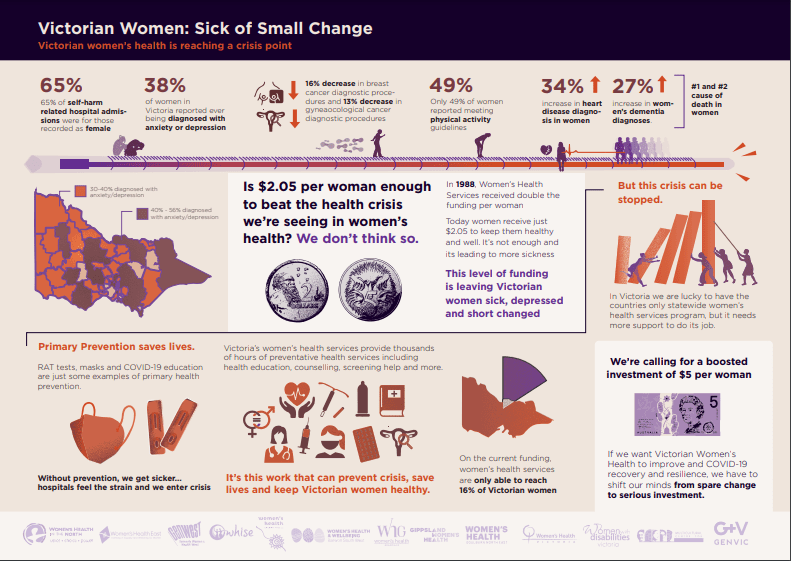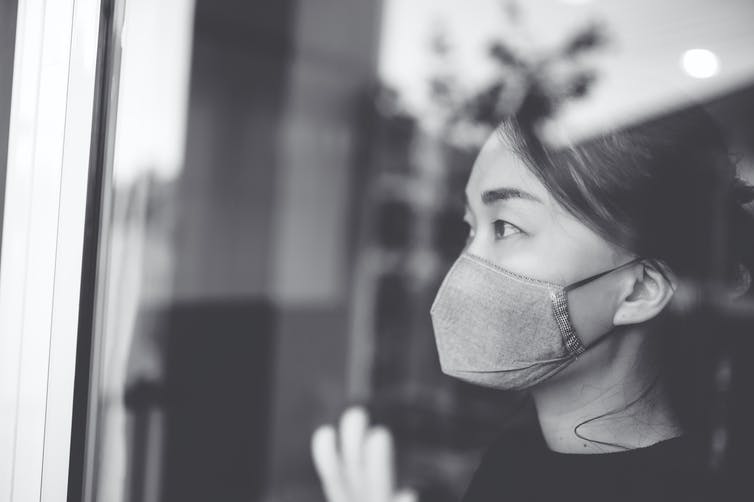The CEOs of Victoria’s 12 women’s health services came together today to issue an urgent plea for immediate government investment to curtail the unfolding crisis of women’s declining health in the state.
It comes with the release of data that shows the impact of COVID-19 on the physical and mental health and wellbeing of women in Victoria, and how current funding levels are inadequate for improving outcomes.
The group is calling for women’s health services funding to be increased from $2.05 per women per year, to $5.75 per woman.
At an online event branded with the hashtag #sickofsmallchange, Women’s Health Services Council Chair Tricia Currie pointed out that the funding being asked for to improve women’s health in the state equates to less than cost of two cups of coffee, per woman. The group is calling for investments to improve health outcomes for women with disabilities, Indigenous women, LGBTQI+ women, trans and gender diverse people, as well as migrant and refugee women, and those living in rural and regional areas in Victoria.
“Before the pandemic, women’s health was under significant strain,” Currie said at the event. “It is now much worse. Spare change funding is making women sicker.”
Kit McMahon, CEO of Women’s Health in the South East, said the data clearly indicates that women are being let down by a lack of funding.
“The data is clear and the evidence is there. From a local perspective, the pandemic has not only revealed inequity in health, it has exacerbated it and we’ve seen an increase in inequity,” McMahon said.
“It’s the fact these issues are intersecting and affecting the lives of women, who are already in lower, underpaid, insecure work and at greater levels of harm in the community – even before the pandemic.”

Nadia Mattiazzo, CEO of Women with Disabilities Victoria, said an investment in the health of women with disability in Victoria would be game-changing.
“We don’t receive ongoing funding. We definitely need this investment. It would mean more access to information, resources and networks for all us so we can feel safe,” Mattiazzo said. “It would help us to advocate for and promote accessibility in health services, and empower women with disabilities to advocate for the services they would actually need.”
Dr Adele Murdolo, CEO of Multicultural of Women’s Health, shared that migrant and refugee women in Victoria have real issues accessing the health services they need.
“For migrant women, the services are not there, they are underfunded. And if they are there, they are not necessarily appropriate,” she said. “The data is showing higher rates of acute issues that could have been prevented had they had better access to prevention and a network of services.”
“Women and migrant women are the ones looking after our aged care residents, working in supermarkets, in factories and places like abattoirs. They are less likely to work from home and that has made them more susceptible to catching COVID.”
Marina Carman, Director of Rainbow Health, said although the impact of the pandemic on LGBTQI+ communities in under researched, there is a growing picture that tell us things have gotten worse, especially around mental health.
“We know that LGBTQI+ communities are experiencing alarming mental health issues. There are particular concerns for bisexual people, particularly bisexual women, for young people, and trans people.”
CEO of Women’s Health Goulburn North East Amanda Kelly said COVID-19 has “decimated women’s health and wellbeing” in the northeast Victoria region and the Goulburn Valley.
“Women across our region live the impact of chronic and ongoing under-investment in their health, wellbeing and gender equality everyday. Over half of women in Benalla have experienced anxiety or depression at some stage in their lives,” Kelly said.
“COVID-19 has decimated women’s health and wellbeing, and gender inequality persists in northeast Victoria and the Goulburn Valley. Without dedicated investment in our services and primary prevention, the health and wellbeing of women in our region will continue to decline.”


